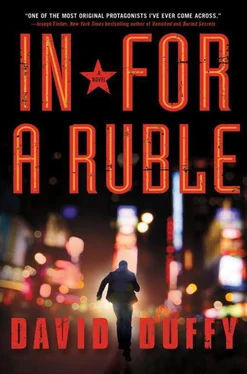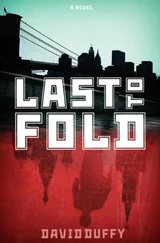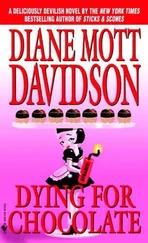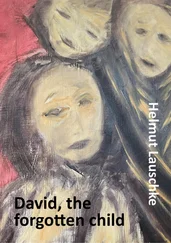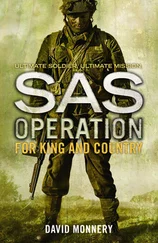“And it still took Iakov and your language skills to get you out?”
“I don’t think he had any idea I existed.”
“The Cheka would have.”
I shrugged. “Maybe. I haven’t been able to find those records. And I’ve been looking.”
“And your Grandpa Turba—the funny Stalinist—what about him?”
“He worked for Dzerzhinsky.”
“ Dzerzhinsky!? As in Felix, founder of the Cheka, Dzerzhinsky?”
“That’s right. Turba helped set it up. He was also an early victim—he was purged and sent to the camps to die in 1937.”
“And you still believe Iakov just happened to pick you out of a crowd of zeks ?”
“Yes. Why?”
“You’ve got Cheka royalty running through your blood, and you can ask that?”
“I didn’t know any of this until after my career was over. I learned it all since I moved to New York.”
The waitress offered coffee. Aleksei declined. I did as well. He retreated to his thoughts, and I left him there.
A good ten minutes passed before he said, “We joked in New York about you being the first ex-Chekist. I almost believed it at the time. I guess I wanted to believe it, once I figured you were my father. Now I’m not so sure.”
“Why not? What’s changed?”
Another long wait before he said, “That night at JFK, with Iakov—seems to me, looking back now, the whole thing could’ve been a setup. I wandered into it, and you improvised.”
“I improvised, that’s true. To get you out of there.”
“Maybe. The Cheka cuts too deeply into all of us, I guess.”
“What’s that supposed to mean?”
“You didn’t tell Polina about your Gulag past. You say you were ashamed, you say you were scared. Now you tell me how each of my ancestors is more deeply wired into the Cheka than the next. What’s the motivation this time?”
“I don’t see what you’re driving at. I spent the last twenty years trying to find out about my past because I hoped… I hoped some day to have the chance to tell you where you came from.”
“And you thought I’d be as proud of it—the Cheka part—as you are?”
I had no idea how to respond. “I don’t see where pride enters into it,” I said after a moment.
“Don’t you?” His voice was full of feeling now. Anger, bitterness, resentment raced each other to the fore. An explosion was coming, and I was responsible. But what could I have told him differently?
“Aleksei, listen, I’m sorry. I thought… I thought you’d want to know.”
Did I sound as lame to him as I did to myself?
He answered that question by pulling a bundle of notes out of his pocket. He counted off several and tucked them under his empty beer glass.
“Maybe you thought wrong.”
He stood and left, grabbing his overcoat from the rack without stopping. I didn’t try to follow.
The waitress approached hesitantly. I held out the dish of money and ordered a vodka. Half an hour later, having ordered and drunk another, I was still trying to figure out what had happened. I’d underestimated whatever was eating at him as badly as I had his mother a lifetime earlier.
I tried calling him several times over the next two days, but he was busy or avoiding me. Then I had dinner with Sasha and he dropped the hammer about Beria. How would I ever explain that—if I got the chance?
Beria disappeared at the South Street Seaport. I got home to find my neighbors, Tina and John, loading suitcases into a cab.
“Going skiing,” Tina piped in her eternally upbeat way. Tina’s very sweet and what Americans unkindly call an airhead. I think it’s both sexist and unfair to rank a woman’s brains ahead of her other attributes, which Tina has in abundance. Today, her coat was open and her woolly sweater and leather pants stretched tight over her full figure. I tried not to observe too closely since her husband, a former linebacker for the New York Giants, is Foos’s size and solid muscle. I told them to have a good trip and went upstairs to shower.
* * *
I got the Potemkin out of the garage and drove to Bedford. It’s a foolish car, especially in winter when you can’t put the top down and a rear-wheel-drive boat is useless in snow and ice. But I don’t get a chance to drive much, and I love the feel of a battleship, albeit an American battleship, on the road.
Marianna Leitz lived on East Meadow Road, a winding, empty country lane lined by old maples, white fences, and stone walls demarcating horse farms and big estates. I found her driveway between two large columns with an electronic gate and a security camera. The gate was open.
I stopped outside to check my messages. A gray Toyota Camry rolled past and disappeared around a bend. I listened to a Gatling-gun recording from Julia Leitz recounting all of the important things she was working on, none of which meant anything to me, before she said, “I might be able to do six, if this deal doesn’t blow. If that happens, all bets are off. Come here at six, but call first. I could be in crisis mode.” Sounded like crisis mode was a perpetual state she rather enjoyed, as her brother said. Nothing from Leitz’s ex-wife or brother-in-law or brother.
The Camry came back the other way. The driver turned his head as he passed. A balding man of about my age. Maybe he was lost. Or maybe he was working.
Marianna’s driveway was long, and the house, when it finally came into view, grand, white, and handsome. Big, bare-branched trees dotted the wide, snow-covered lawn. A fenced pool area to one side, tennis court nearby, and a large children’s jungle gym–swing complex opposite.
It took a few minutes before she answered the door. She would have been attractive on a good day, but good days had been few and far between in recent months. She looked like hell this morning. Deep creases marred an otherwise fine face. Gray-brown bags hung from brown eyes surrounded by roadmap-red whites. She wore jeans and a sweatshirt and had made no attempt at makeup. Her shoulder-length blond hair frizzed in every direction. She didn’t remotely resemble a rich woman living in the lap of luxury. She made a meager effort to smile hello, accompanied by an attempt at a limp handshake, which she couldn’t quite manage.
She led me through an entrance hall and a dining room that sat twenty into a sprawling kitchen. Dirty dishes filled the double sink and spilled onto the countertop.
“Sorry,” she said, waving carelessly in their direction. “I’m a little behind.”
That was an opening, but I let it pass. Better to let her decide when to tell her story.
“I appreciate you taking the time to see me.”
She tried to smile again. “Distraction is a good thing these days. Coffee?”
I had the uncharitable feeling the coffee might be the same vintage as the dishes. I declined. She went to the counter and poured herself a cup. She kept her back to me as she took a bottle from the cabinet, added a shot and put the bottle back. Self-medicating, the attempt to hide it more form than function. I know the signs, the feeling. I’ve done it myself.
Marianna pointed to a table with four chairs by the window. It had a view of the swing set and jungle gym.
“Like I said, I appreciate your time.”
She waved again. Time was one thing she had in abundance and didn’t want.
“I’m wondering if you’ve been visited by anyone asking about your brother.”
“Sebastian called, said you’d be asking. I told him… no.”
Her voice was tentative, even through the booze.
“I can understand that, but…”
“But what?”
“I’m working for your brother, I’m trying to help. I don’t have to tell him everything people tell me.” I let that sink in. “There was someone, right?”
Читать дальше
